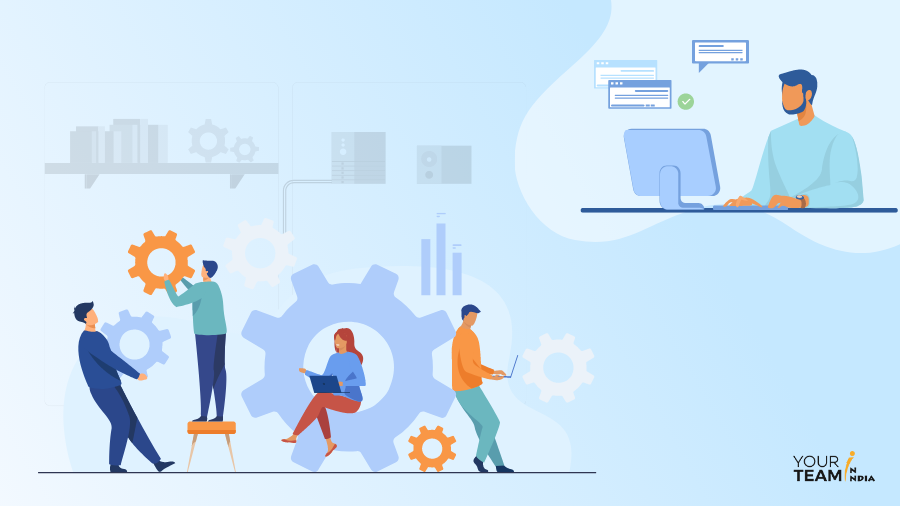Match Project Requirements with the Right Level of Developer Expertise
Enhance your project’s success by selecting developers with the right level of expertise. Understand what level of developer fits your project needs and build a dedicated team within a few hours.
- Your offshore development partner

Hire the Right Type of Developer for Your Project Needs
Ensure your project’s success by hiring developers with the right skills and experience. Whether you need fresh energy, experienced leadership, or strategic oversight, we have the perfect fit for your business.
Entry-Level Developer
Entry-level developers are emerging professionals starting their careers in software development. They are ideal for handling foundational tasks and learning from more experienced colleagues, acting as a valuable addition to the project’s growth.
Experience: 0-2 Years
Key Responsibility Areas (KRAs)
- Participate in training to improve coding skills.
- Write and implement basic code under guidance.
- Help with testing and debugging to ensure quality
- Maintain documentation and report progress.
- Collaborate with the team and learn from feedback.

Junior Developer
Junior developers are responsible for contributing to various development tasks, improving software features, and collaborating with the team to advance project objectives. They handle coding tasks of moderate complexity, work with the team to develop software features, and support debugging and testing efforts.
Experience: 2-4 Years
Key Responsibility Areas (KRAs)
- Develop and enhance software modules and features.
- Resolve bugs and improve existing code.
- Collaborate with senior developers and team members.
- Maintain and update code documentation.
- Stay current with new technologies and best practices.

Senior Developer
Senior developers are responsible for designing and implementing complex features, leading system enhancements, and ensuring code capability. They are also responsible for mentoring junior developers and troubleshooting advanced issues.
Experience: 4-7 Years
Key Responsibility Areas (KRAs)
- Lead feature development, mentor juniors, and collaborate with stakeholders.
- Develop advanced features, guide juniors, and align with goals.
- Deliver complex features, mentor the team, and ensure alignment
- Tackle challenges, mentor, and meet stakeholder goals.
- Drive feature development, mentor, and align solutions.

Tech Lead
The tech lead guides the development team, ensures that coding standards are met, and makes key architectural decisions. They act as the bridge between the technical team and management to ensure the project’s technical direction aligns with the business.
Experience: 7-10 Years
Key Responsibility Areas (KRAs)
- Lead the team, ensuring best practices and coding standards.
- Make key architecture and technology stack choices.
- Mentor developers and guide the team.
- Review code to ensure quality and performance.
- Facilitate communication between the team and stakeholders.
.png?width=776&height=798&name=4%20(1).png)
Tech Architect
The tech architect is responsible for defining the overall structure of a project and selecting appropriate technologies. They provide strategic technical direction, ensuring scalability, security, and performance across the entire system.
Experience: 10+ Years
Key Responsibility Areas (KRAs)
- Design system architecture to meet project needs.
- Choose technologies and tools for scalability.
- Develop strategies aligning with business goals.
- Identify and mitigate technical risks.
- Guide the team to ensure architectural quality.
.png?width=776&height=798&name=5%20(1).png)
Entry-level developers are emerging professionals starting their careers in software development. They are ideal for handling foundational tasks and learning from more experienced colleagues, acting as a valuable addition to the project’s growth.
Experience: 0-2 Years
Key Responsibility Areas (KRAs)
- Participate in training to improve coding skills.
- Write and implement basic code under guidance.
- Help with testing and debugging to ensure quality.
- Maintain documentation and report progress.
- Collaborate with the team and learn from feedback.
Junior developers are responsible for contributing to various development tasks, improving software features, and collaborating with the team to advance project objectives. They handle coding tasks of moderate complexity, work with the team to develop software features, and support debugging and testing efforts.
Experience: 2-4 Years
Key Responsibility Areas (KRAs)
- Develop and enhance software modules and features.
- Resolve bugs and improve existing code.
- Collaborate with senior developers and team members.
- Maintain and update code documentation.
- Stay current with new technologies and best practices.
Senior developers are responsible for designing and implementing complex features, leading system enhancements, and ensuring code capability. They are also responsible for mentoring junior developers and troubleshooting advanced issues.
Experience: 4-7 Years
Key Responsibility Areas (KRAs)
- Lead feature development, mentor juniors, and collaborate with stakeholders.
- Develop advanced features, guide juniors, and align with goals.
- Deliver complex features, mentor the team, and ensure alignment.
- Tackle challenges, mentor, and meet stakeholder goals.
- Drive feature development, mentor, and align solutions.
The tech lead guides the development team, ensures that coding standards are met, and makes key architectural decisions. They act as the bridge between the technical team and management to ensure the project’s technical direction aligns with the business.
Experience: 7-10 Years
Key Responsibility Areas (KRAs)
- Lead the team, ensuring best practices and coding standards.
- Make key architecture and technology stack choices.
- Mentor developers and guide the team.
- Review code to ensure quality and performance.
- Facilitate communication between the team and stakeholders.
The tech architect is responsible for defining the overall structure of a project and selecting appropriate technologies. They provide strategic technical direction, ensuring scalability, security, and performance across the entire system.
Experience: 10+ Years
Key Responsibility Areas (KRAs)
- Design system architecture to meet project needs.
- Choose technologies and tools for scalability.
- Develop strategies aligning with business goals.
- Identify and mitigate technical risks.
- Guide the team to ensure architectural quality.
Entry-level developers are emerging professionals starting their careers in software development. They are ideal for handling foundational tasks and learning from more experienced colleagues, acting as a valuable addition to the project’s growth.
Experience: 0-2 Years
Key Responsibility Areas (KRAs)
- Participate in training to improve coding skills.
- Write and implement basic code under guidance.
- Help with testing and debugging to ensure quality.
- Maintain documentation and report progress.
- Collaborate with the team and learn from feedback.
Junior developers are responsible for contributing to various development tasks, improving software features, and collaborating with the team to advance project objectives. They handle coding tasks of moderate complexity, work with the team to develop software features, and support debugging and testing efforts.
Experience: 2-4 Years
Key Responsibility Areas (KRAs)
- Develop and enhance software modules and features.
- Resolve bugs and improve existing code.
- Collaborate with senior developers and team members.
- Maintain and update code documentation.
- Stay current with new technologies and best practices.
Senior developers are responsible for designing and implementing complex features, leading system enhancements, and ensuring code capability. They are also responsible for mentoring junior developers and troubleshooting advanced issues.
Experience: 4-7 Years
Key Responsibility Areas (KRAs)
- Lead feature development, mentor juniors, and collaborate with stakeholders.
- Develop advanced features, guide juniors, and align with goals.
- Deliver complex features, mentor the team, and ensure alignment.
- Tackle challenges, mentor, and meet stakeholder goals.
- Drive feature development, mentor, and align solutions.
The tech lead guides the development team, ensures that coding standards are met, and makes key architectural decisions. They act as the bridge between the technical team and management to ensure the project’s technical direction aligns with the business.
Experience: 7-10 Years
Key Responsibility Areas (KRAs)
- Lead the team, ensuring best practices and coding standards.
- Make key architecture and technology stack choices.
- Mentor developers and guide the team.
- Review code to ensure quality and performance.
- Facilitate communication between the team and stakeholders.
The tech architect is responsible for defining the overall structure of a project and selecting appropriate technologies. They provide strategic technical direction, ensuring scalability, security, and performance across the entire system.
Experience: 10+ Years
Key Responsibility Areas (KRAs)
- Design system architecture to meet project needs.
- Choose technologies and tools for scalability.
- Develop strategies aligning with business goals.
- Identify and mitigate technical risks.
- Guide the team to ensure architectural quality.
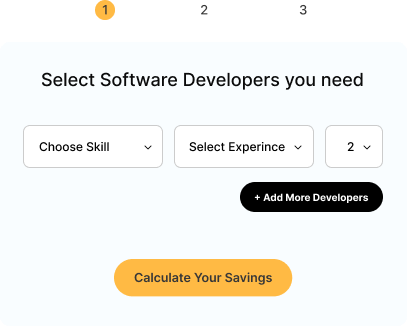
.png)
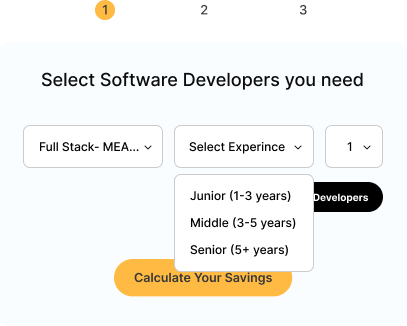
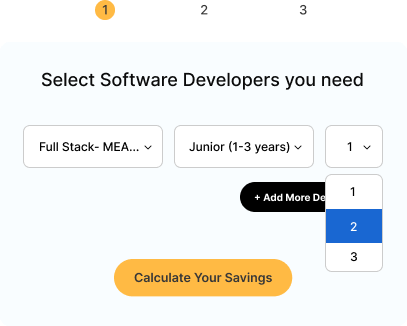
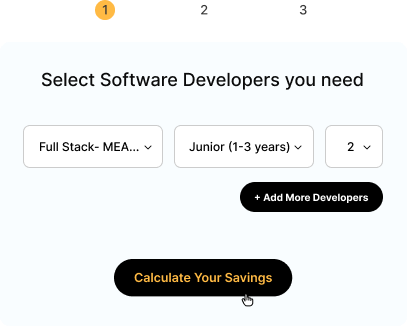
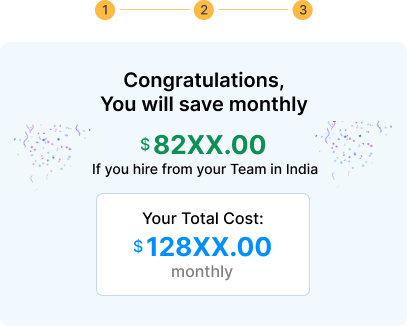
Start your offshore journey with us to access global talent, cost-effectiveness, and seamless collaboration.
Calculate NowWhen to Hire What Level of Developer?
Different project needs will demand different expertise; hence, you need to hire developers based on their respective skills and experience levels.
- When to Hire
- Entry-Level Developer
- Junior Developer
- Senior Developer
- Tech Lead
- Tech Architect
- Initial Project Phases
- Handles routine tasks
- Supports specific components
- Assists with advanced components
- Not typically needed at this stage
- Not typically needed at this stage
- Budget-Conscious Projects
- Cost-effective for simple tasks
- Good value for moderate tasks
- Higher cost for critical tasks
- Useful for strategic guidance if budget allows
- High cost; used for large-scale projects
- Simple or Well-Defined Tasks
- Handles basic coding and documentation
- Manages straightforward development tasks
- Manages more complex tasks and integrations
- Guides team through development phases
- Not necessary for simpler tasks
- Complex Feature Development
- Not suitable
- Suitable for implementing complex features
- Leads development of complex features
- Oversees complex feature integration
- Designs high-level architecture and solutions
- Project Scaling
- Useful for scaling up initial phases
- Scales with additional resources
- Leads larger teams and manages complexity
- Coordinates team efforts and large-scale tasks
- Designs scalable architecture for growth
- Risk Management
- Contributes to basic testing
- Assists in identifying and fixing bugs
- Identifies and mitigates technical risks
- Ensures technical strategies to mitigate risks
- Designs robust architecture to prevent risks
- Long-Term Strategic Planning
- Not typically involved
- Limited involvement
- Provides strategic insights and leadership
- Guides technical strategy and team direction
- Defines long-term architecture and strategy
Benefits of Hiring Different Levels of Developers
Build a dedicated team of developers with a mixed level of experience to take your project to the next level.

Cost-Effectiveness
By balancing seasoned experts with less experienced developers, costs can be easily controlled. Entry-level and junior developers help keep budgets in check, while senior developers and tech leads offer invaluable experience and efficiency.

Knowledge Transfer and Mentorship
Senior developers mentor juniors, sharing their expertise and fostering growth. Junior developers bring fresh perspectives, motivating seniors to stay updated with industry trends.

Innovation and Problem-Solving
A diverse range of experience levels means a variety of approaches to problem-solving. Fresh, innovative ideas from junior developers can combine with the seasoned expertise of senior developers, leading to breakthrough solutions.

Flexibility and Scalability
Having developers with different skill sets ensures your team is prepared for anything. Entry-level developers can tackle foundational tasks, freeing up senior developers to focus on complex challenges.

Long-Term Growth
Investing in junior developers fosters a culture of learning and creates a pipeline of talent for the future. A mixed-level team also promotes knowledge sharing and collaboration, creating a positive work environment that attracts and retains valuable employees.

Diverse Problem-Solving Approaches
Different levels of experience often lead to varied approaches to problem-solving. This diversity of thought encourages creativity and can lead to more comprehensive and effective solutions.
Whatever your developer needs may be, we have just the right resources.
-1.png?width=365&height=300&name=Group%20(2)-1.png)
Find the Right Developer for Your Project Needs
Explore our talent pool and match the perfect developer level to your project.
Success Stories: How Our Developers Have Made a Difference
We assist both new and emerging startups in developing MVPs, forming teams, and gaining access to cutting-edge technologies. From application creation to modernization and maintenance, our 360° enterprise solutions cover it all.

GoHire
Leading Application Tracking System (ATS) in Europe
Project Scope- GoHire wanted to build a robust hiring solution for SMEs globally that allowed them to hire the right candidates for their organization easily and quickly.
Solution Delivered- After a detailed discussion with clients regarding the project requirements, YTII recommended the Product Engineering Model of the Offshore Development Center
Read Full Story
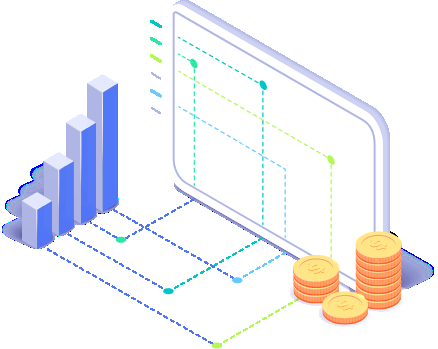
Dorey Finance
Actuarial Technology (AcTech) company in Guernsey
Project Scope – The client wanted to upgrade its financial tool to improve user experience, reduce operational costs, and address performance issues caused by outdated technology.
Solution Delivered – We helped them deploy a senior developer within two weeks, upgraded tech stack, and optimized performance and overall operational efficiency.
Read Full Story

Finding You
Robust Dating App in Luxembourg
Project Scope – Finding You wanted to create a dating app combining astrology and psychometric analysis and build a budget-friendly, user-friendly matching engine.
Solution Delivered – The app was built with advanced astrological charting and filtering features, while marketing efforts helped expand the user base globally.
Read Full Story

Gettrx
Leading Payment Gateway in US
Project Scope – Gettrx sought a dependable team of experienced IT resources that took care of end-to-end development and management of the solution while ensuring code standards were being met at all time.
Solution Delivered – Your Team" in India deployed highly skilled software engineers with 6+ years of experience in handling complex product development in an agile work model
Read Full Story

Plena Data
Financial Process Automation (USA)
Project Scope – The client sought an offshore software development company that could provide them with the right talent to build premium-quality bots in a quick turnaround time while ensuring complete IP protection.
Solution Delivered – With a team of highly skilled professionals working on developing RPA solutions, the client was able to deliver high-quality bots to their customers quickly and efficiently.
Read Full Story
Frequently Asked Questions
With Your Team In India, you can find the best developers to work with for all your project needs.
Different types of developers include entry-level developers, junior-level developers, senior developers, tech leads, and tech architects.
You can determine the right type of developer based on the specific technical requirements. Further, our team at YTII can help you hire the right type of developer based on your project needs.
Yes, you can hire a mix of different developer levels for your project, such as junior, mid-level, and senior developers, to match the complexity and requirements of the tasks.
The key skills to look for in each type of developer include proficiency in programming languages, frameworks, and tools specific to their respective roles, along with adaptability and problem-solving abilities.
Our Blog
Read on the topics that matter most to you through our comprehensive research articles & informative blogs.
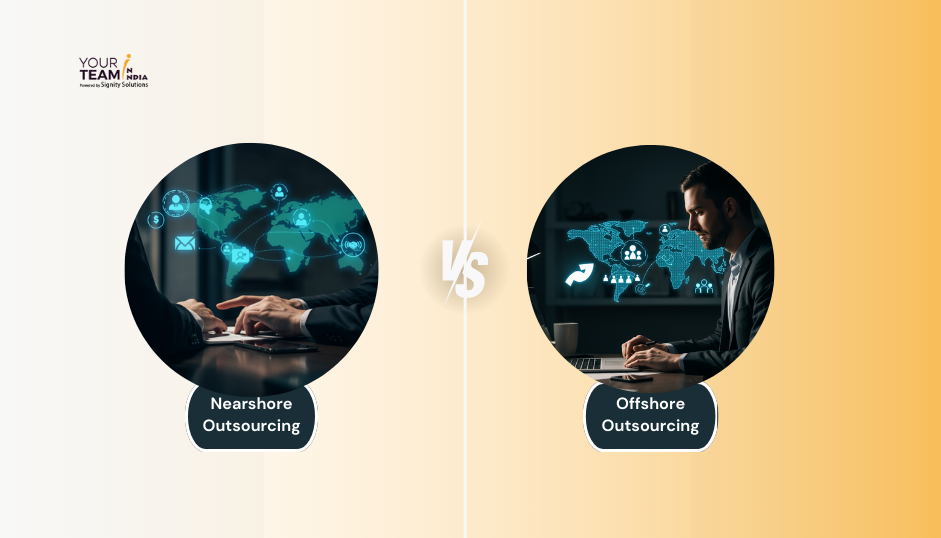
Nearshore vs Offshore Outsourcing: All You Need to Know

How Can You Collaborate With Developers for a New Product Launch
